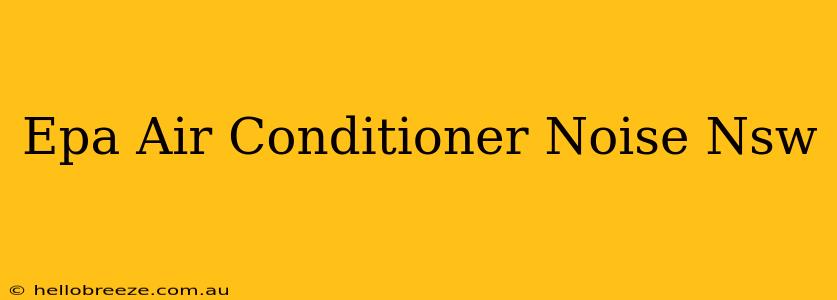Are you experiencing excessive noise from your air conditioner in NSW and wondering about EPA regulations? This guide will delve into the noise limits for air conditioners in New South Wales, helping you understand your rights and what actions you can take if your unit is too loud.
Understanding NSW Noise Pollution Laws and Air Conditioners
New South Wales has strict regulations regarding noise pollution, enforced by local councils. These regulations apply to all noise sources, including air conditioners. While there isn't a single, specific "EPA air conditioner noise" decibel limit universally applied across NSW, the acceptable noise levels are generally determined by considering:
- Time of day: Noise limits are often stricter during nighttime hours.
- Location: Residential areas typically have lower noise limits than commercial or industrial zones.
- Type of noise: Constant, repetitive noises like those from air conditioners are often subject to stricter limits than intermittent noises.
Your local council's Environmental Noise Policy will outline the specific noise levels permitted in your area. It's crucial to consult this document for accurate information relevant to your property.
Finding Your Local Council's Noise Policy
To find your local council's noise policy, simply search online for "[Your Council Name] Environmental Noise Policy" or visit their official website. The policy will detail permitted noise levels and procedures for reporting noise complaints.
Identifying Excessive Air Conditioner Noise
Determining whether your air conditioner is excessively noisy often involves subjective judgment. However, you can consider these factors:
- Comparison to other units: Is your unit noticeably louder than similar air conditioners in your neighborhood?
- Impact on your well-being: Does the noise disrupt your sleep, concentration, or daily activities?
- Type of noise: Is the noise a constant hum, a loud rattling, or a high-pitched whine? Different noises may indicate different problems.
If you suspect your air conditioner is generating excessive noise, take note of:
- The time of day the noise occurs.
- The duration of the noise.
- The specific nature of the noise (e.g., humming, rattling, screeching).
This information will be helpful when reporting the issue to your local council.
Reporting Excessive Air Conditioner Noise to Your Council
If you've determined your air conditioner, or a neighbor's, is causing unacceptable noise levels, the next step is to contact your local council. They'll usually have a specific process for reporting noise complaints, often involving an online form or a phone call. Be prepared to provide the information you've gathered about the noise.
Troubleshooting Noisy Air Conditioners
Before filing a formal complaint, consider troubleshooting potential issues with your own air conditioner:
- Clean the condenser coils: Clogged coils can restrict airflow, leading to increased noise.
- Check for loose parts: Rattling sounds often indicate loose components.
- Inspect fan blades: Bent or damaged blades can cause excessive noise.
- Ensure proper installation: Incorrect installation can lead to vibrations and noise.
If self-troubleshooting doesn't solve the problem, consider contacting a qualified air conditioning technician for professional assessment and repair.
Conclusion: Ensuring Peaceful Coexistence with Your Air Conditioner
Understanding NSW's noise pollution laws concerning air conditioners is essential for maintaining a peaceful living environment. By familiarizing yourself with your local council's regulations, you can effectively address excessive noise and ensure your air conditioner operates within acceptable limits. Remember, proactive troubleshooting and communication with your council can resolve noise issues before they escalate.

